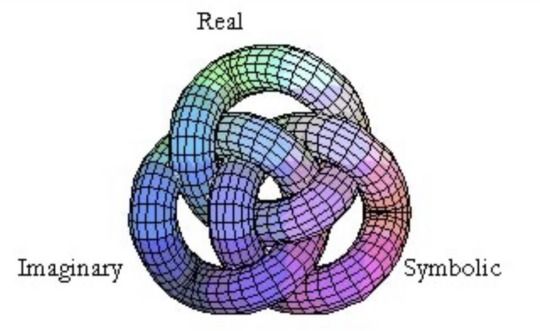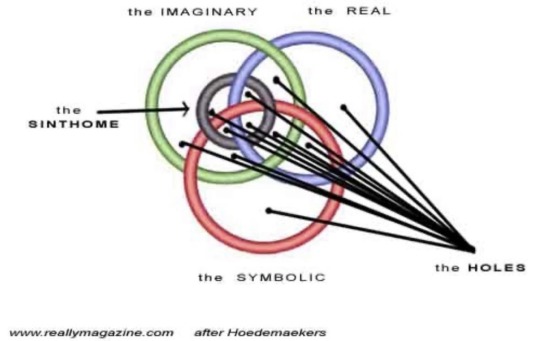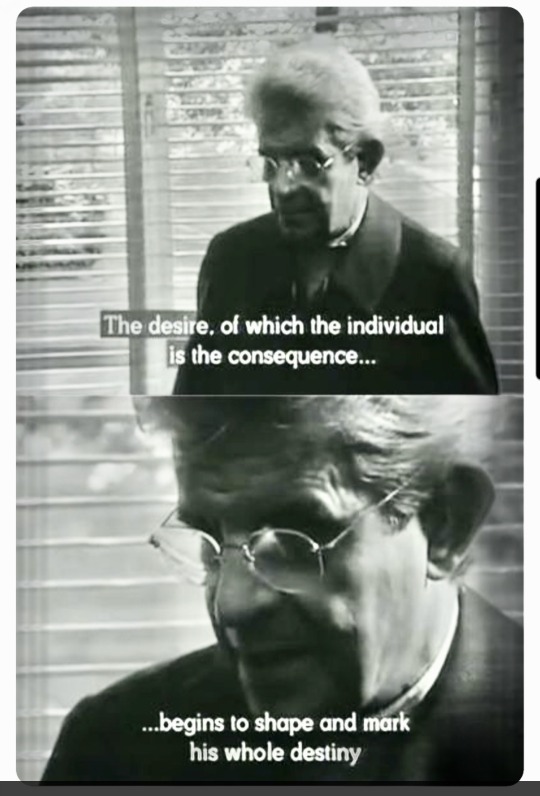#lacan
Text
For a certain kind of person — the person who, usually, strives to be a responsible parent, a sensitive friend, an upright citizen, a person who tries to care about their community — it can be impossible not to succumb to the incessant urge to mimic someone else’s supposed balance and feeling of wellness in life. What do we even know about them really?
I’m increasingly seeing this in my work as a therapist in New York City. So are my colleagues. One said to me recently that he was tired of listening to his patients talk about the impossible advice inhaled on Instagram and TikTok — to say nothing of the self-help industry. “Doesn’t anyone come asking to be more free?” he exclaimed. “They don’t,” I said pessimistically. “Everyone wants to make the right decisions.” The problem is it’s very hard to tell someone that pursuing the abstract question of “right and wrong” ways to live will lead you into a cul-de-sac. It avoids the deeper question of desire, and desire is a compass.
The promised image of goodness skirts pleasures that — for obscure reasons — you aren’t sure you can want. I see patients grow fearful when they can’t tell if what they desire is compulsive — just another rote, maybe addictive, behavior, or a real attempt to test the boundaries they live under. How do you locate free will in a world this compulsory? Unsettling desires challenge our perception of who we are and what life might look like. ...
My patients have spent time on the couch struggling with the joys and pains that come with their wish to take drugs, not to expand consciousness but just because; quit their job, not to re-evaluate life but simply to stop working (along with the bonus pleasure of thumbing their nose at their employers); or give in to an irksome captivation with the wrong person at the absolutely wrong time. ...
These pursuits certainly aren’t what you ought to do — much less post about — and yet I find that it’s when we dwell on our secret enjoyments that we learn the most about ourselves. Sexual and aggressive feelings, veering self-destructive, are finally confronted without the veneer of rationalization.
--Jamieson Webster, "I Don’t Need to Be a ‘Good Person.’ Neither Do You."
897 notes
·
View notes
Text
Trauma’ is a term that has long been used in medicine and surgery. It comes from the Greek τϱαŭμα, meaning wound, which in turn derives from τιτϱοσχω, to pierce.
‘Trauma’ is a term that has long been used in medicine and surgery. It comes from the Greek τϱαŭμα, meaning wound, which in turn derives from τιτϱοσχω, to pierce. It generally means any injury where the skin is broken as a consequence of external violence, and the effects of such an injury upon the organism as a whole; the implication of the skin being broken is not always present, however–we may speak, for example, of ‘closed head and brain traumas’.
In adopting the term, psycho-analysis carries the three ideas implicit in it over on to the psychical level: the idea of a violent shock, the idea of a wound and the idea of consequences affecting the whole organisation.
Laplanche, J. and Pontalis, J.-B. (1973) The Language of Psychoanalysis. London: Hogarth Press – Reprinted by Karnac Books 1988
#lacan#psychoanalysis#unconscious#jouissance#lacanian real#freud#lacan unconscious#lacan object petit a desire#real symbolic imaginary#objet petit a#trauma#Laplanche Pontalis#wound#real
96 notes
·
View notes
Text
When you encounter the gaze of the Other, you meet not a seeing eye but a blind one. The gaze is not clear or penetrating, not filled with knowledge or recognition; it is clouded over and turned back on itself, absorbed in its own enjoyment. The horrible truth … is that the gaze does not see you. … You are on your own; the gaze of the Other is not confirming, it will not validate you.
—Joan Copjec
#words#copjec#Read My Desire#lacan#psychoanalysis#lacanian psychoanalysis#the other#the gaze#otherness#recognition#validation#joan copjec#philosophy#theory#theoryblr
359 notes
·
View notes
Text
“O que o ser humano deseja, é ser desejado por outro ser humano.”
— Jacques Lacan.
63 notes
·
View notes
Text
It is in the nature of animals to lack grace. To reflexively react. To fight. To flee. To devour. To teem with fecundity.
Mankind also possesses these abilities, but with the additional ability that leaves him capable of silently contemplating and reflecting on all of these things with language.
And I'm not sure who is better off. Animals or mankind.
83 notes
·
View notes
Text
My new edited book: “Analyzing ‘Adventure Time‘”!
Hey, did you know that I edited a scholarly book about Adventure Time? Yup, that’s right, it’s called Analyzing Adventure Time, and it features over a dozen scholarly essays about the one cartoon about that kid and the dog. The book will be coming out this summer from McFarland & Co! Here’s the cover:
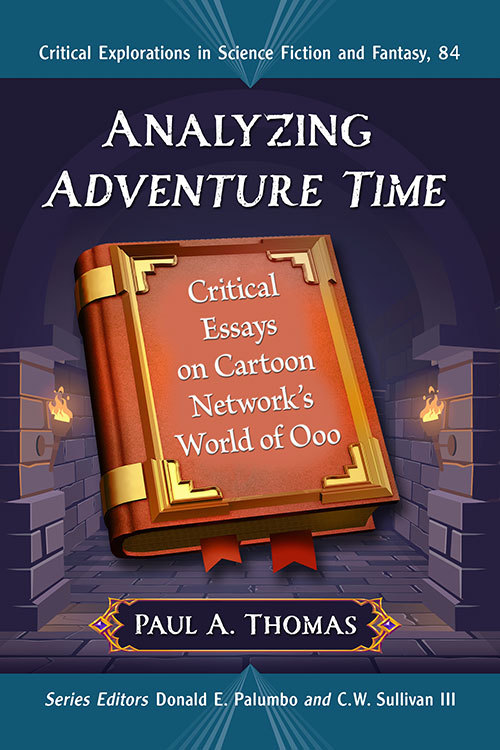
I’m pretty psyched about the project in general, but it’s doubly-cool that this book will be a part of McFarland’s “Critical Explorations in Science Fiction and Fantasy” series! Either way, if you’re interested, you can pre-order a copy here.
And here’s the table of contents + contributors for those who are interested:
Introduction (Paul A. Thomas)
Prelude: "The Three Levels of Adventure Time" (Paul A. Thomas)
"Be More Than the Binary: Experiencing Queer Subjectivity with BMO" (Olivia M. Vogt)
"From Censorship to 'Obsidian': A Critical and Historical Look at 'Bubbline'" (Mage Hadley)
"Rainbows and Unicorns: The Influence of Bubbline on Apocalyptic Film and Animation" (Steven Holmes)
"'Get your hero on, dude!' Charting Jake’s Growth as a Positive Masculine Role Model" (Bridget M. Blodgett and Anastasia Salter)
"Yellow Voices and Rainbow Bodies: Accent, Multilingualism, and the Politics of Representation in Adventure Time" (Camille Chane)
"Mikhail Bakhtin in the Land of Ooo: The Carnivalesque, Heteroglossia, and the Fun That Never Ends" (Aaron Kerner and Birdy Wei-Ting Hung)
"'And we will happen again and again': Adventure Time and the Sisyphean Struggle" (Sequoia Stone)
"What Time Is It? Postmodernity! Postmodern Praxis in Adventure Time" (Jenine Oosthuizen)
"Making a New Meaning for Man in The Land of OOO: Object-Oriented Ontology, the NonHuman, and Difference in Distant Lands" (Al Valentín)
"Too Close for Comfort: On Finn the Human and Princess Bubblegum’s Relationship" (Zhi Hwee Goh)
"Of Lacan and Lemons: A Psychoanalytic Reading of Season Six’s 'The Mountain'" (Paul A. Thomas)
"Trauma and the Body in Adventure Time" (Steven Kielich)
"The Japanese Spirit and Aesthetic in Western Animation: The Influence of Anime on Adventure Time" (Kendra N. Sheehan
"'Bad Jubies': Giving Value to the Intangible in Artistic Professions" (Catalina Millán Scheiding)
Note that this is different work from Exploring the Land of Ooo... that work is going to be reissued this year by the University Press of Mississippi, though, so stay tuned for news about that as well!
#adventure time#atimers#finn the human#jake the dog#princess bubblegum#marceline the vampire que#marceline#bubbline#lemongrab#lacan#scholarship#pop culture#mcfarland and company#mcfarland
301 notes
·
View notes
Text
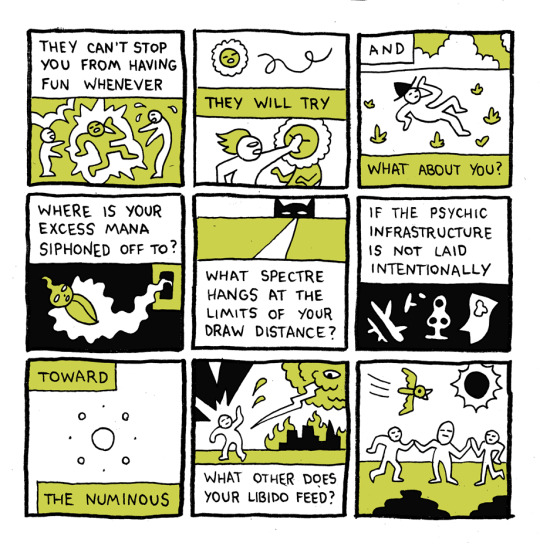
I super owe this tumblr some posts! Might get experimental for a while
350 notes
·
View notes
Text
¿Cuestión de lógica?

La psicología clínica tiene infinidad de vertientes, como el humanismo, asociacionismo, conductismo, psicoanálisis, terapia centrada en el cliente (pues en quien más 🙄) etc. Todas son sumamente diferentes unas con respecto de otras, ni se diga el psicoanálisis, que es una práctica con mucho pedigrí. Pero sin importar de cuál se trate, todas tienen algo en común, se trata de un detalle que las hermana, y es la palabra. No importa qué terapia, corriente o vertiente sea, en todas la herramienta de trabajo es la palabra. "El síntoma es el lenguaje no apalabrado", decía el psicoanalista francés Jacques Lacan. La palabra es nuestro medio de trabajo y de intervención y más aún lo es el lenguaje. Todo es lenguaje y no hay nada que no lo sea, puesto que nuestro mundo está determinado por el lenguaje. Ludwig Wittgenstein decía "el límite de mi mundo es el limite de mi lenguaje".
El abogado penalista Gerardo Laveaga, en "Neurociencias: el futuro del derecho penal", señala la importancia de los neurotransmisores (sustancias químicas segregadas por diferentes organos del cuerpo y sirven para regular diferentes funciones organicas, algunos de ellos son la norepirefrina, oxitocina, noradrenalina, etc.) en la impartición de justicia. Este abogado penalista sugiere que en el futuro, el perfil de los jueces será completamente diferente al actual, ya que al considerar dichos neurotransmisores, la visión, interpretación y aplicación de las leyes cambia radicalmente, es decir, si a una persona determinada, sea juez o delincuente, le falta o sobra determinado neurotransmisor, entonces su conducta cambiará, al igual que su decisión (o falta de ella) por seguir o no las normas sociales que puedan llevarlo a cometer delitos, desde los más simples hasta los más graves, o a la impartición de justicia (esta última ya de por sí subjetiva).
Y resulta que tanto las leyes escritas, así como su interpretación y aplicación se realizan con la palabra, la cual en un sentido químico, está dirigida directamente por la producción y procesamiento de los neurotransmisores en el cuerpo del individuo.
Por ejemplo, en la psicóloga criminal y forense, cuyo objetivo es el estudio y análisis de la conducta criminal y su prevención, la palabra y el lenguaje tienen una función imprescindible en el devenir de dicha práctica psicológica. Ya que una palabra tiene o puede tener múltiples significados, es decir, la palabra es polisemántica, también una interpretación puede tener múltiples variantes.
Entonces con este detalle, toda la psicóloga enfrenta un gran problema metodológico, que más o menos a sabido sortear. Y digo "más o menos" porque, aunque la psicología en el campo de la investigación utiliza el método científico, aún así es imposible transmutar lo subjetivo en objetivo, y uno de los pilares del método mencionado es que el objeto de estudio así como sus instrumentos de medición deben ser "objetivos". ¿Cómo puede algo tan subjetivo como lo es la psicología, ser tan objetiva como lo exige el método científico, método que es crucial en el desarrollo de la psicología? Vaya tremendo vericueto en el que se metió esta práctica.
Aunque el intento de Laveaga por explicar la conducta humana dentro del campo de la justicia (y en general) es interesante, los neurotransmisores no son el único origen de la conducta y pensamiento humanos, de ser así, la humanidad simplemente ya no existiría, se habría auto extinto por involuntad (inconsciencia) propia. Mi neologismo apunta a que el humano estaría sujeto a lo que dicten sus neurotransmisores únicamente. La teoría del penalista no es nueva, para nada, dentro del campo de la medicina, psicología y psiquiatra la cuestión de los neurotransmisores como batuta de la conducta humana, está altamente revisada y revisitada infinidad de veces. Pero sí es nueva dentro del campo del derecho, por lo menos lo es en el ámbito que él plantea.
¿Qué tiene qué ver Laveaga y el derecho penal con el análisis lingüístico psicológico? Pues en primera porque soy un ávido lector de sus escritos, y en segunda porque su tesis acerca de la interpretación de las leyes y de la conducta humana es compatible con el análisis metodológico de la psicología clinica respecto de la psicopatología y el diagnóstico de enfermedades mentales y delimitación teórica de las diferentes conductas, muy comúnmente asociadas a desequilibrios mentales.
Ya para concluir, me gustaría mencionar que la palabra y la cuestión de su interpretación como herramienta para el análisis clínico del devenir humano, tanto dentro del consultorio como en sociedad, es por entero una tautología, o sea, que no importa la interpretación, sino lo que importa es la utilidad que se le encuentre o tenga dicha interpretación, sin importar si esta es correcta o no, ya que de hecho, determinar que tal o cual interpretación es correcta o incorrecta, también es subjetivo.
En "Subversión del sujeto y dialéctica del deseo en el inconsciente freudiano", Lacan muestra una clara y puntual diferencia entre la concepción del término "inconsciente" tanto en Lacan como en Freud, o para decirlo de otro modo, la palabra.
Freud, en especial al principio de su concepción del psicoanálisis, hacía mucho énfasis en los neurotransmisores, mientras que Lacan enfatizaba más el lenguaje, a tal grado que llegó a decir que "el inconsciente está estructurado como un lenguaje", y por supuesto lo dijo con toda razón.
Pues el lenguaje, que no es otra cosa más que la palabra en serie, es un pantano muy peligroso y el detalle es que dependemos de ese pantano ominoso, y no tenemos otro lado dónde caminar.
-Juan Manuel.
54 notes
·
View notes
Text
Death
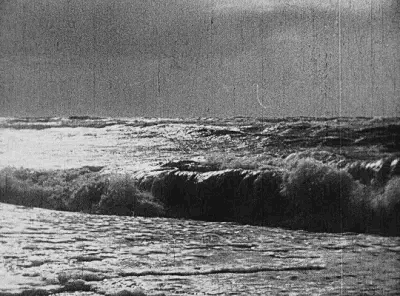
Death belongs to the realm of faith.
You are right to believe you will die.
It sustains you.
If you didn't believe it, could you bear the life you have?
If we could not totally rely on the certainty that it will end, how could you bear all this?
Nevertheless, it is only a matter of faith.
And the worst thing about it is that you are not sure.
youtube
#astrology#astro community#astro tumblr#8th house venus#8th house placements#moon in 8th house#sun in 8th house#saturn in 8th house#jacques lacan#lacan#psychoanalysis#Youtube
92 notes
·
View notes
Text
My depression points to my not knowing how to lose... What is more, the disenchantment that I experience here and now, appears, under scrutiny, to awaken echoes of old traumas, to which I realise I have never been able to resign myself.
My depression points to my not knowing how to lose...
Nevertheless, the power of the events that create my depression is often out of proportion to the disaster that suddenly overwhelms me. What is more, the disenchantment that I experience here and now, cruel as it may be, appears, under scrutiny, to awaken echoes of old traumas, to which I realise I have never been able to resign myself. I can thus discover antecedents to my current breakdown in a loss, death, or grief over someone or something that I once loved. The disappearance of that essential being continues to deprive me of what is most worthwhile in me; I live it as a wound or deprivation, discovering just the same that my grief is but the deferment of the hatred or desire for ascendency that I nurture with respect to the one who betrayed or abandoned me. My depression points to my not knowing how to lose – I have perhaps been unable to find a valid compensation for the loss? It follows that any loss entails the loss of my being – and of Being itself. The depressed person is a radical, sullen atheist.
Julia Kristeva - Black Sun: Depression and Melancholia. Columbia University Press; Reprint edition (1989).
#lacan#psychoanalysis#unconscious#jouissance#lacanian real#freud#lacan unconscious#lacan object petit a desire#real symbolic imaginary#objet petit a#trauma#real#depression#anxiety anxious#angst#dread#loss#grief
42 notes
·
View notes
Text
Once again about Childe and betrayal. I keep thinking of the definition of a hero by a certain psychoanalyst.
A hero is someone who may be betrayed with impunity.
#lacan#it always boils down to lacan with me#he has a looong explanation for why it works like that#a whole chapter in a lecture dedicated to (you'd never guess) humour#and I think about it a lot#I don't think hoyo ever referenced lacan#but that seems like a universal rule#childe#tartaglia#divine messenger of catastrophe
27 notes
·
View notes
Text
An idea is small if it affects only the way you think about some things. An idea is big if it changes the way you think about everything.
To whom big ideas are given, an equally significant responsibility is entrusted.
55 notes
·
View notes
Text
Studying literary criticism means that I observe both #philosophy #literature #lacan and #merthur
22 notes
·
View notes
Text
Irigaray ve Dişil Öznellik

Kristeva ile birlikte Fransız feminist felsefesinin önemli isimlerinden birisi olan Luce Irigaray, psikanalizci olmasının da etkisiyle felsefe düşüncelerinde psikanalizden özellikle de Lacancı yaklaşımdan bir çatı oluşturmuştur.
İlgili olduğu disiplinler olan felsefe ve psikanaliz hakkındaki genel eleştirisi sahip oldukları ataerkil yapı hakkındadır. Ona göre; ataerkil yapı, erkek hegomanyasıdır ve tek cinscilikten oluşur. Bu yapıdan kurtulabilmek için kadınların yeni bir dil ve söylem gereksinimine ihtiyacı vardır. Bu dilin, kadınları erilleştirebileceğine değinir (mimesis). Irigaray mimesis kavramı ışığında; kadın, kadın gibi değil kadın olarak konuşmalıdır der. Bunun olabilmesi için de ataerkil toplum yapısından kopmuş, erillikten dönüştürülmüş özgün bir kadın formuna gerek vardır yani dişil öznelliğe...
Düşüncesinin temelinde kadının erkekleştirmeye zorlayan toplumsal, felsefi normları, düşünce ve davranış kalıplarını reddetmek, kadın bir özne yaratmak yatar. Kadın erkek eşitliğinden ziyade erkek gibi olmamak üzerine yönelir. Çünkü kadından yaratılmak istenen, eksik erkek kabul edilemezdir. Aksi takdirde ataerkil anlayış devam ettiği sürece kadın toplumdan dışlanacak ya da erkekleşmeye zorlanacaktır.
#irigaray#feminizm#feminist#lacan#psikanaliz#felsefe#felsefe bilim#kristeva#mimesis#ataerkil#toplum#kadın#dil bilim
31 notes
·
View notes
